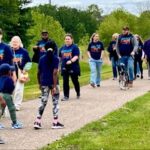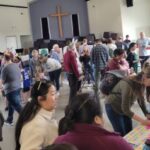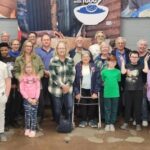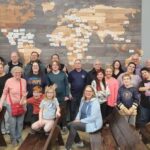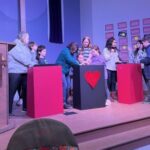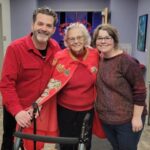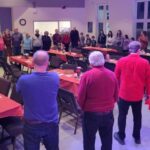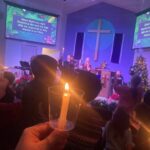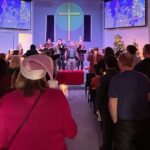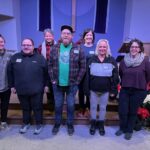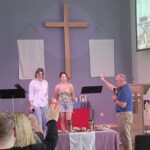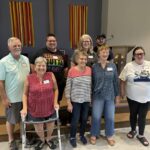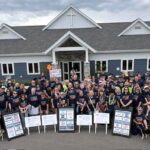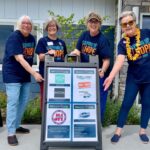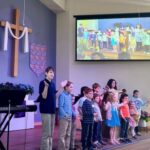Monday, June 30
Psalm 139
O Lord, you have searched me and known me.
You know when I sit down and when I rise up;
you discern my thoughts from far away.
You search out my path and my lying down
and are acquainted with all my ways.
Even before a word is on my tongue,
O Lord, you know it completely.
You hem me in, behind and before,
and lay your hand upon me.
Such knowledge is too wonderful for me;
it is so high that I cannot attain it.
Where can I go from your spirit?
Or where can I flee from your presence?
If I ascend to heaven, you are there;
if I make my bed in Sheol, you are there.
If I take the wings of the morning
and settle at the farthest limits of the sea,
even there your hand shall lead me,
and your right hand shall hold me fast.
If I say, “Surely the darkness shall cover me,
and night wraps itself around me,”
even the darkness is not dark to you;
the night is as bright as the day,
for darkness is as light to you.
For it was you who formed my inward parts;
you knit me together in my mother’s womb.
I praise you, for I am fearfully and wonderfully made.
Wonderful are your works;
that I know very well.
My frame was not hidden from you,
when I was being made in secret,
intricately woven in the depths of the earth.
Your eyes beheld my unformed substance.
In your book were written
all the days that were formed for me,
when none of them as yet existed.
How weighty to me are your thoughts, O God!
How vast is the sum of them!
I try to count them—they are more than the sand;
I come to the end—I am still with you.
O that you would kill the wicked, O God,
and that the bloodthirsty would depart from me—
those who speak of you maliciously
and lift themselves up against you for evil!
Do I not hate those who hate you, O Lord?
And do I not loathe those who rise up against you?
I hate them with perfect hatred;
I count them my enemies.
Search me, O God, and know my heart;
test me and know my thoughts.
See if there is any wicked way in me,
and lead me in the way everlasting.
As we get ready to hear a sermon series called, “My Favorite Scriptures” this week we’ll read devotions on six important chapters in the Old Testament.
Take some extra time to write out the significant chapters in the Old Testament for you. The exercise is worth your time.
This Psalm starts out, “O Lord, you have searched me and known me.” (Psalm 139:1) The writer of the Psalm then went deep into describing how God knew him (most likely the writer was male) and what impact this knowledge made for his life. Make sure you read all twenty-four verses. This is one of the richest chapters in the Bible. Read these verses slowly, attentively, and carefully.
Pastor Paul has shared a story of a seminary professor saying that if a person read this Psalm every day for thirty days that person’s life would change.
When each of us understands that God knows us completely then we will be encouraged to go deeper in our relationship with God. God knows every part of us. And God loves us. We can’t escape or hide from God.
What difference does it make to you that God knows you so completely? Please share.
Tuesday, July 1
Isaiah 6:1-8
In the year that King Uzziah died, I saw the Lord sitting on a throne, high and lofty, and the hem of his robe filled the temple. Seraphs were in attendance above him; each had six wings: with two they covered their faces, and with two they covered their feet, and with two they flew. And one called to another and said,
“Holy, holy, holy is the Lord of hosts;
the whole earth is full of his glory.”
The pivots on the thresholds shook at the voices of those who called, and the house filled with smoke. And I said, “Woe is me! I am lost, for I am a man of unclean lips, and I live among a people of unclean lips, yet my eyes have seen the King, the Lord of hosts!”
Then one of the seraphs flew to me, holding a live coal that had been taken from the altar with a pair of tongs. The seraph touched my mouth with it and said, “Now that this has touched your lips, your guilt has departed and your sin is blotted out.” Then I heard the voice of the Lord saying, “Whom shall I send, and who will go for us?” And I said, “Here am I; send me!”
When Isaiah had this encounter with God in the Temple his life was changed. Isaiah received a vision of God. The vision was awesome and touched Isaiah at the core of his being.
Isaiah encountered holiness at the deepest level. In experiencing this holiness, he realized that he did not compare at all to God. He saw his many flaws. “Woe is me!” he said. “for I am a man of unclean lips, and I live among a people of unclean lips; yet my eyes have seen the King, the Lord of hosts!” (Isaiah 40:5)
Even though Isaiah knew he was fallen in comparison to God, Isaiah knew that God accepted him. Not only that, God commissioned or called Isaiah to be God’s representative.
At the end of this story the seraph or angel reached out and touched Isaiah’s lips with a piece of hot coal. The seraph asked the question who would be God’s representative. Isaiah responded immediately. Isaiah would go!
God does not send perfect people to do God’s work. God sends all of us—even those of us who know how deep our faults and problems are.
Have you had a time in your life that you knew you were supposed to do something? Everything about the task seemed so right. The task might not have been easy, but you knew you had to do it. Please share.
Wednesday, July 2
Isaiah 40:1-8
Comfort, O comfort my people,
says your God.
Speak tenderly to Jerusalem,
and cry to her
that she has served her term,
that her penalty is paid,
that she has received from the Lord’s hand
double for all her sins.
A voice cries out:
“In the wilderness prepare the way of the Lord;
make straight in the desert a highway for our God.
Every valley shall be lifted up,
and every mountain and hill be made low;
the uneven ground shall become level,
and the rough places a plain.
Then the glory of the Lord shall be revealed,
and all flesh shall see it together,
for the mouth of the Lord has spoken.”
A voice says, “Cry out!”
And I said, “What shall I cry?”
All flesh is grass;
their constancy is like the flower of the field.
The grass withers; the flower fades,
[when the breath of the Lord blows upon it;
surely the people are grass.
The grass withers; the flower fades,]
but the word of our God will stand forever.
Many believe that this chapter starts a new section of Isaiah. Some have called this section Second Isaiah. This section goes from chapter 40 to 55.
The people of the nation of Judah had been exiled from their home. They were forced to travel to the nation of Babylon where they would be in slavery.
And the words from God through Isaiah to the people were “Comfort, O comfort my people.” (Isaiah 40:1)
God knew what was happening with the people and reached the people at their greatest need. God was willing to comfort the people.
Some people see the writings of the prophets as God comforting the afflicted and afflicting the comfortable. We see this in this chapter.
Have you had an experience of the comfort of God? Please share.
Thursday, July 3
Jeremiah 1:4-10
Now the word of the Lord came to me saying,
“Before I formed you in the womb I knew you,
and before you were born I consecrated you;
I appointed you a prophet to the nations.”
Then I said, “Ah, Lord God! Truly I do not know how to speak, for I am only a boy.” But the Lord said to me,
“Do not say, ‘I am only a boy,’
for you shall go to all to whom I send you,
and you shall speak whatever I command you.
Do not be afraid of them,
for I am with you to deliver you,
says the Lord.”
Then the Lord put out his hand and touched my mouth, and the Lord said to me,
“Now I have put my words in your mouth.
See, today I appoint you over nations and over kingdoms,
to pluck up and to pull down,
to destroy and to overthrow,
to build and to plant.”
These words are similar to Psalm 139. God told Jeremiah that God formed Jeremiah and knew him. Jeremiah was consecrated a prophet before he was even born. Jeremiah was created to follow the call of God.
Jeremiah was afraid because he was a young boy—probably a teenager. And as a teenager he had difficulty accepting the significant responsibility that God was giving to him.
Of course, this did not deter God. Do not claim your young age as a disqualification, God essentially told Jeremiah. You will go to where I send you.
Just like in the Isaiah story we read on Tuesday, Jeremiah was touched by God. God touched Jeremiah’s mouth. God told Jeremiah that God would give Jeremiah the words that Jeremiah needed to follow this calling.
Take some time to ponder the six verbs in verse ten. They are quite different and even vast. What do you find significant about them? Please share.
Friday, July 4
Micah 6:6-8
“With what shall I come before the Lord
and bow myself before God on high?
Shall I come before him with burnt offerings,
with calves a year old?
Will the Lord be pleased with thousands of rams,
with ten thousands of rivers of oil?
Shall I give my firstborn for my transgression,
the fruit of my body for the sin of my soul?”
He has told you, O mortal, what is good,
and what does the Lord require of you
but to do justice and to love kindness
and to walk humbly with your God?
“He has told you, O mortal, what is good; and what does the Lord require of you but to do justice, and to love kindness, and to walk humbly with your God?” (Micah 6:8)
This verse is worth committing to memory. It is so significant that it’s worth writing down and then carrying the piece of paper in our pocket.
Micah wanted to know what God wanted from him. This is a question that most people eventually ask. “God, what do you want from me?”
Micah proposed offering a gigantic offering to God. A thousand rams, ten thousand rivers of oil.
God was not interested in the quantity of Micah’s offering. God wanted Micah to live out the 8th verse.
How does this story touch you? Please share.
Saturday, July 5
Amos 5:18-24
Woe to you who desire the day of the Lord!
Why do you want the day of the Lord?
It is darkness, not light,
as if someone fled from a lion
and was met by a bear
or went into the house and rested a hand against the wall
and was bitten by a snake.
Is not the day of the Lord darkness, not light,
and gloom with no brightness in it?
I hate, I despise your festivals,
and I take no delight in your solemn assemblies.
Even though you offer me your burnt offerings and grain offerings,
I will not accept them,
and the offerings of well-being of your fatted animals
I will not look upon.
Take away from me the noise of your songs;
I will not listen to the melody of your harps.
But let justice roll down like water
and righteousness like an ever-flowing stream.
“But let justice roll down like waters, and righteousness like an ever-flowing stream.” (Amos 5:24)
This verse is very similar to the verse we memorized yesterday. And this verse from Amos is worth committing to memory.
God wasn’t interested in the worship or the gatherings or the offerings that the people were sharing with God. What God wanted was a quality of the people’s heart. God wanted the people to do acts of justice and righteousness. This was most important to God.
At the start of these verses God questioned why the people wanted, “the day of the Lord.” “The day of the Lord” was a dark day of judgment—think of it like some conceptions of the second coming.
God didn’t want people to expect “the day of the Lord.” Instead God wanted people to do acts of justice and righteousness.
What do these verses tell you about God? Please share.




